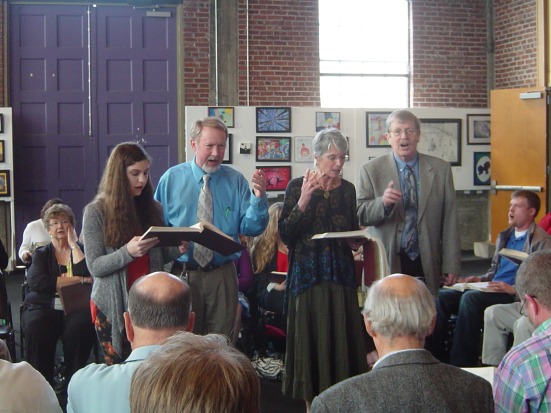Traditions new and old will converge on Sunday at the Powerhouse, where performers and audience members alike will take part in a Sacred Harp singing.
Sacred Harp singing dates back to the 19th century and is making its 38th appearance here in Oxford. Singers from all over the South and the rest of the country will make the trip here to participate in what can only be described as a harmonious musical and social event, where people come together, sing songs from the “Sacred Harp” songbook, socialize and eat foods provided by locals.
Event organizer and former Ole Miss professor Warren Steel has been involved the event here since its beginning in 1981 and has been singing since he was young boy. Growing up in upstate New York, Steel happened upon the “Sacred Harp” songbook has been enamored with it ever since. Bringing the event to Oxford is a bit of a homecoming as the sessions have since gone global.
 “It was just in the Deep South, and eventually, people started discovering it. Now, they have it in just about every state,” Steel said. “They have it in Ireland, England, Poland and even in Japan – they sing in English. It’s like wherever you go, you find friends, someone you share a common interest with.”
“It was just in the Deep South, and eventually, people started discovering it. Now, they have it in just about every state,” Steel said. “They have it in Ireland, England, Poland and even in Japan – they sing in English. It’s like wherever you go, you find friends, someone you share a common interest with.”
This common thread is shared among all ages and people of all walks of life who share a passion for singing. The history of Sacred Harp singing itself is rooted in tradition. Some of the songs are religious in nature, but the sessions themselves are non-denominational.
“There’s a lot of depth to it. Almost all of the songs are religious music (and lyrics),” Steel said. “A lot of them come from the Psalms, but many people are interested in singing who are not religious or who are not Christian.”
Sacred Harp singing has been bringing people together ever since its creation in the 1800s. Steel explained how early singings were places where politicians would meet constituents, and boys and girls would meet up. Since then, the events have spread and welcomed singers new and old.
“Outside the South, people that came into it were quite a bit younger, but there are still young people in Mississippi learning it and doing it,” Steel said. “It goes through the generations and has a kind of depth to it.”
A hollow square is created by the singers who then are invited to lead from the center, choose a song and keep time with their hands.
“(People) don’t have to sing. They are welcome to try, and we’ll have extra books there, but everyone is welcome to sit and listen,” Steel said. “They’ll want people to bring something (food) because a lot of people are coming from Alabama, Tennessee, Texas or even other states.”






